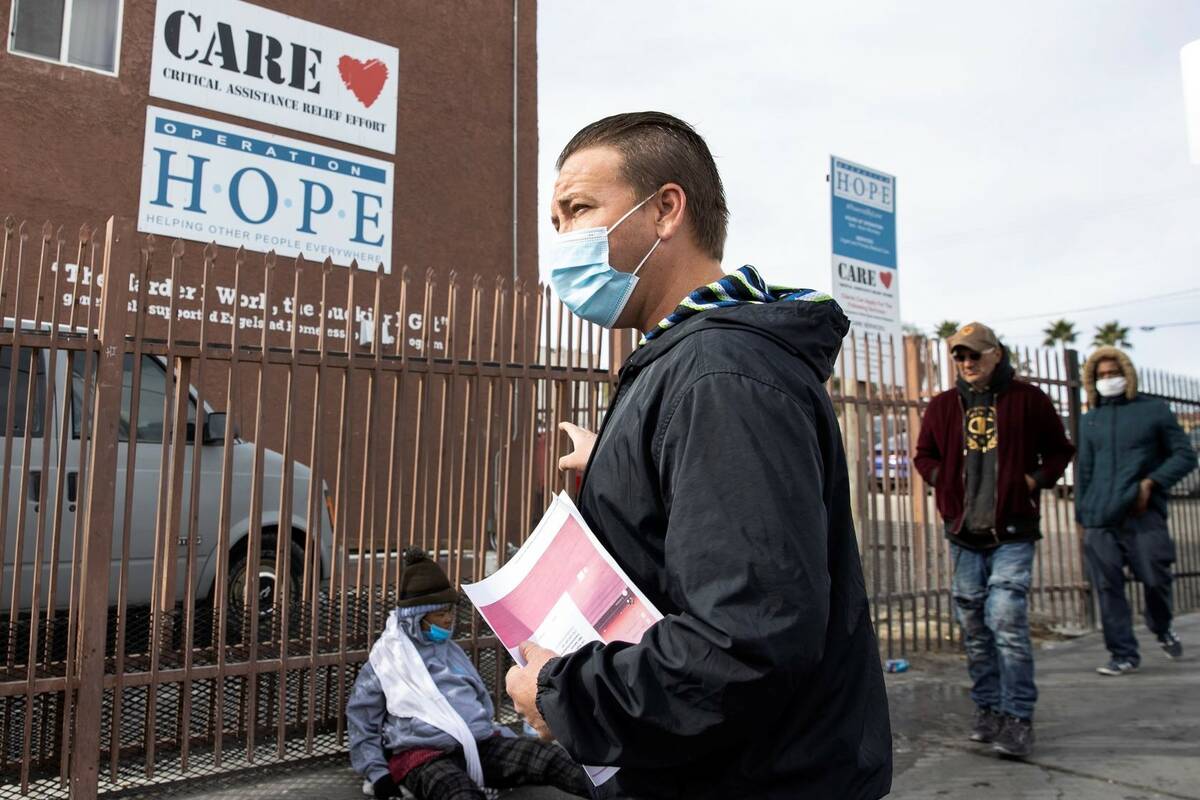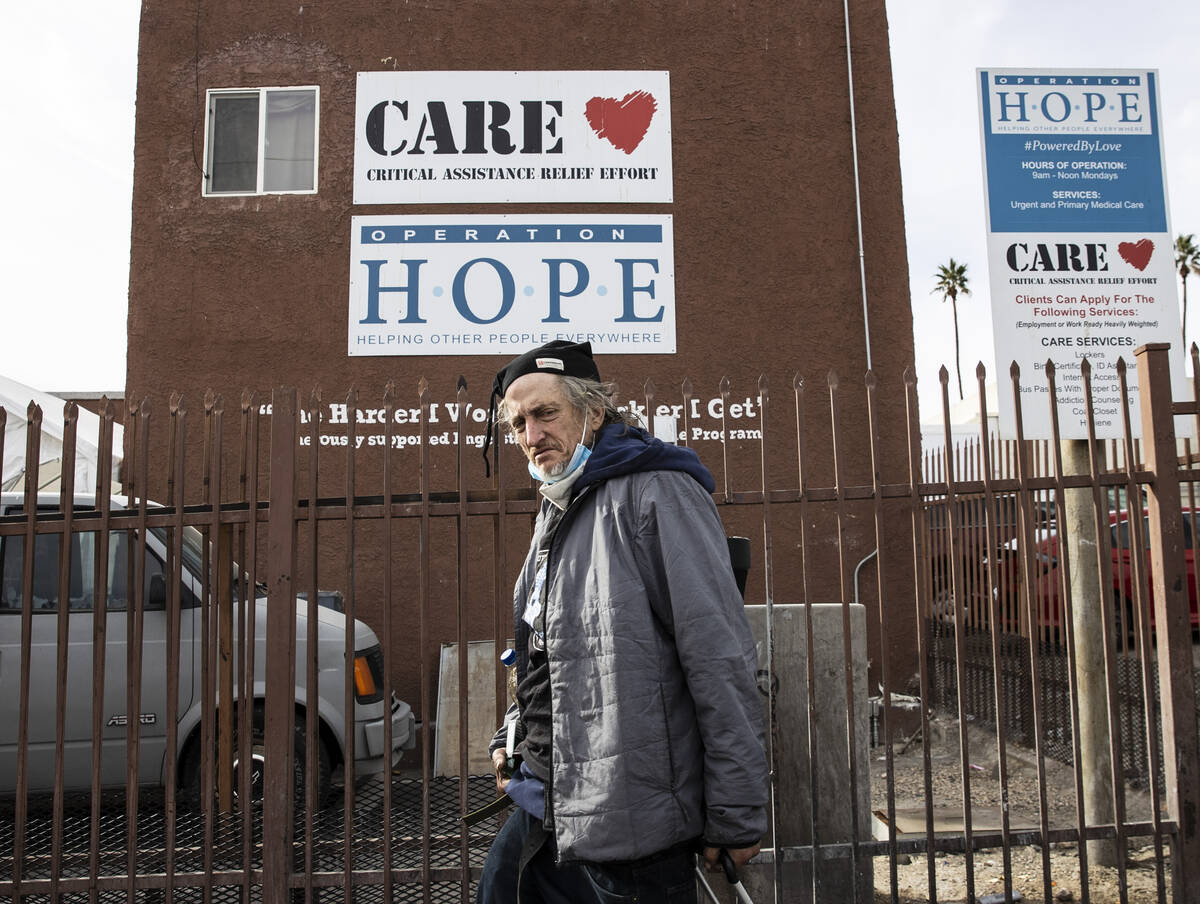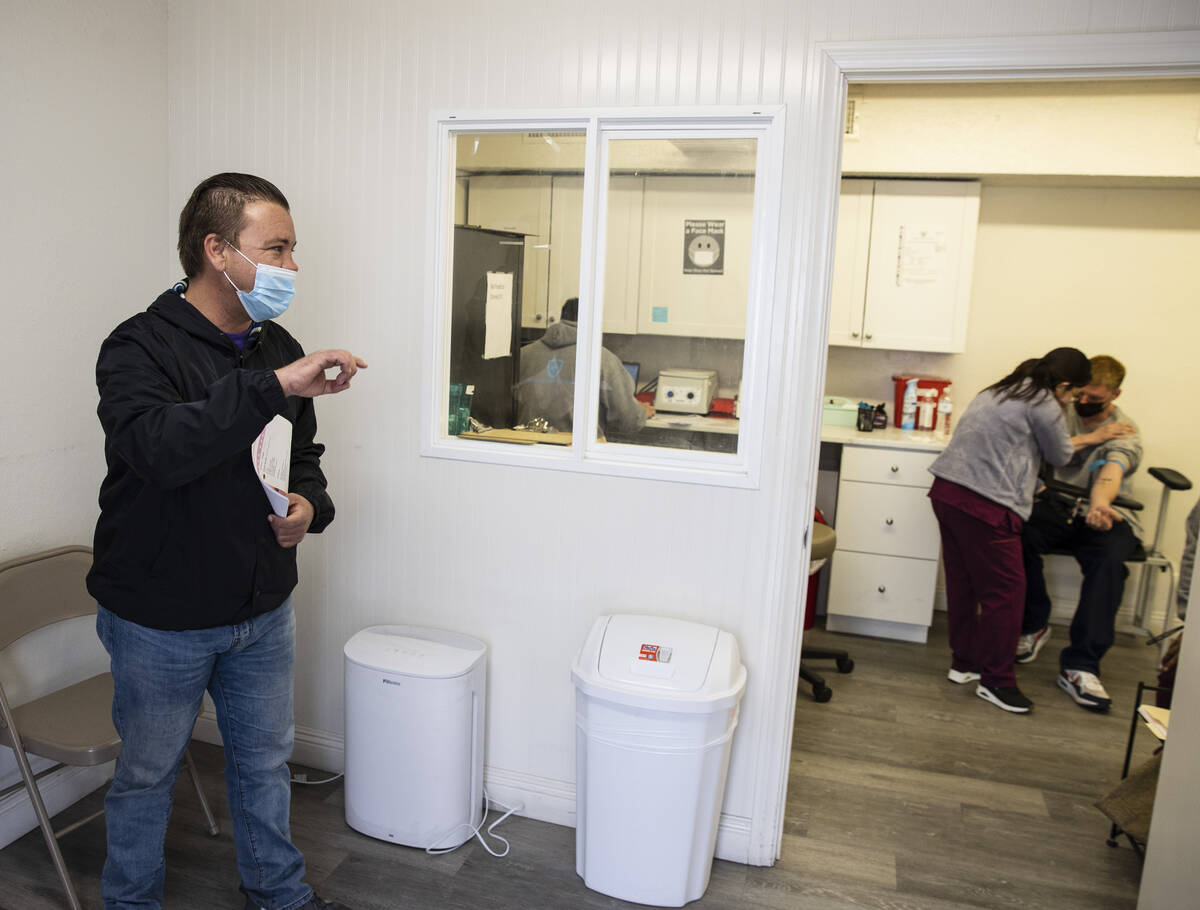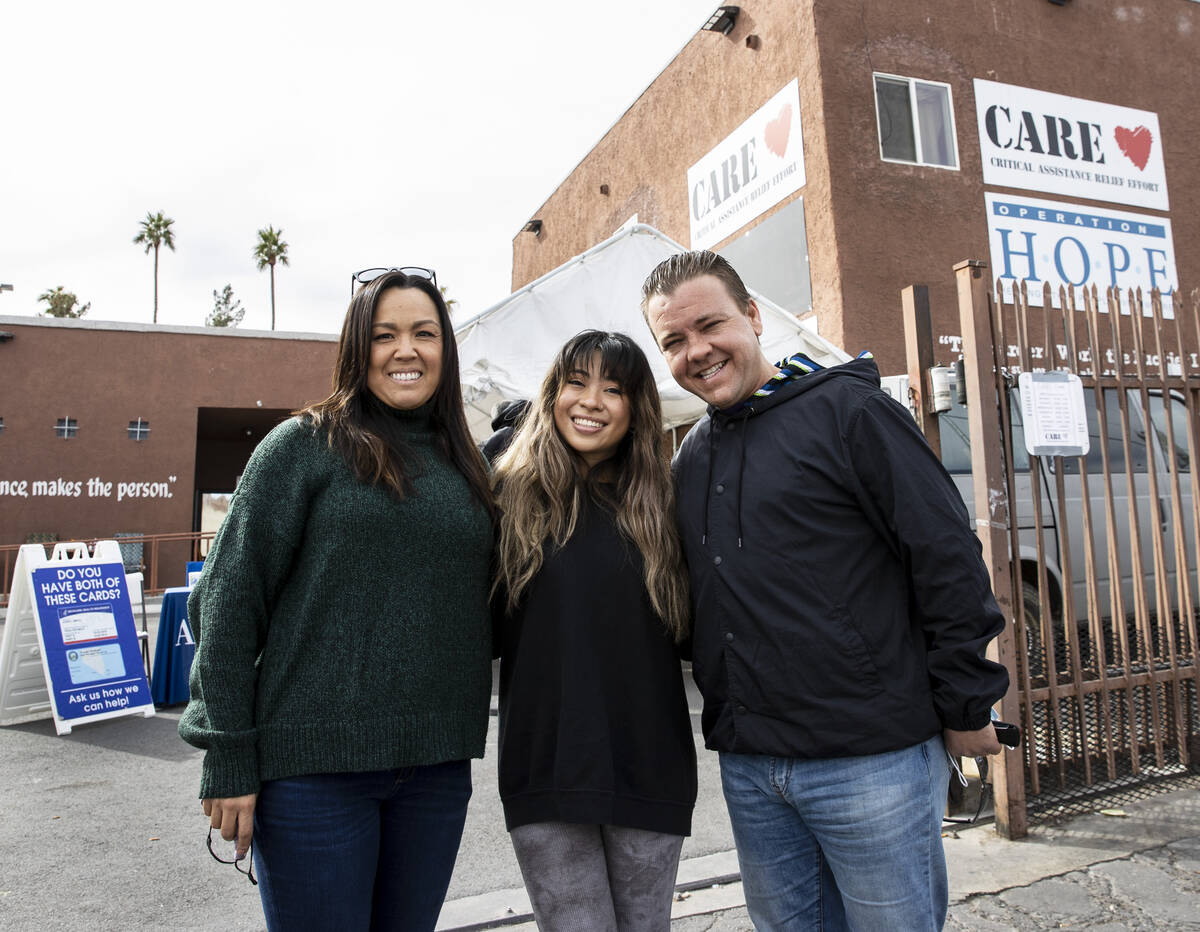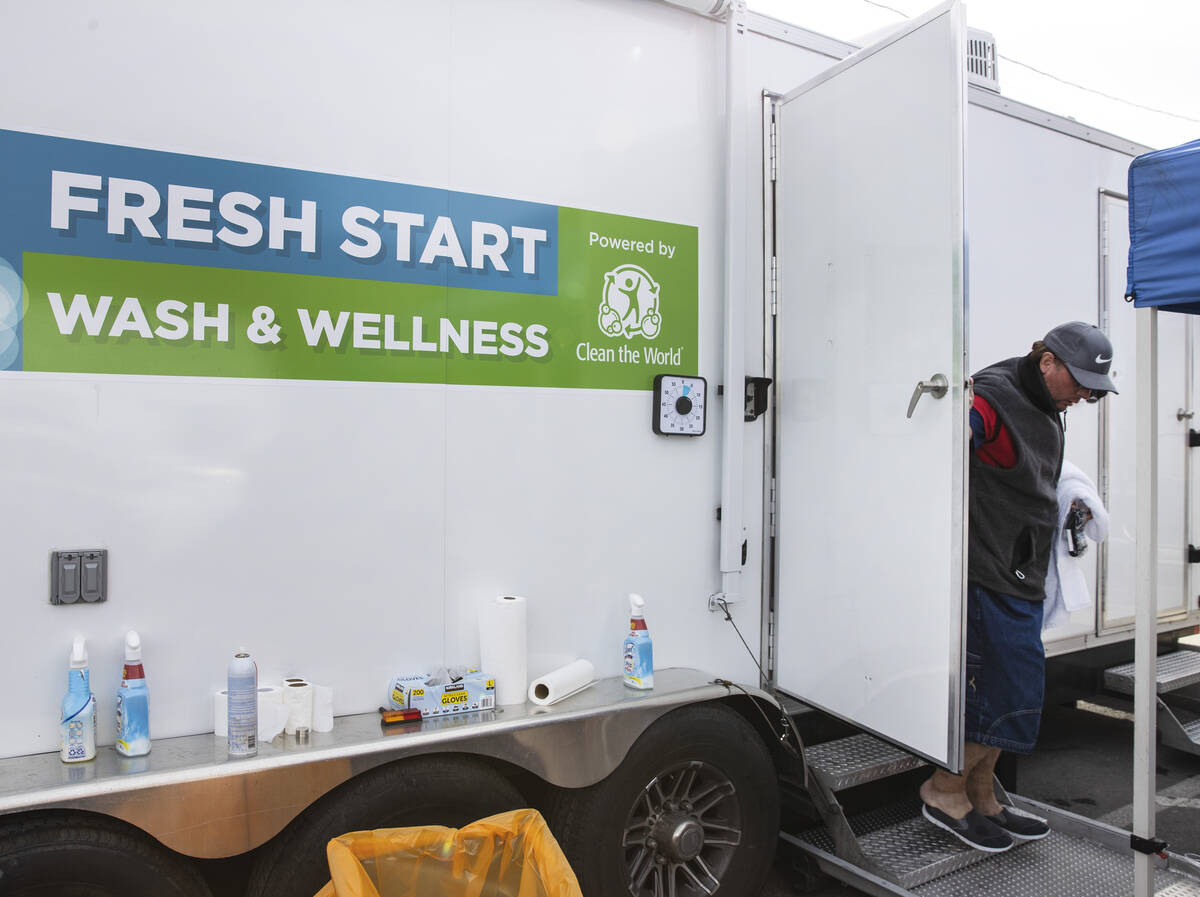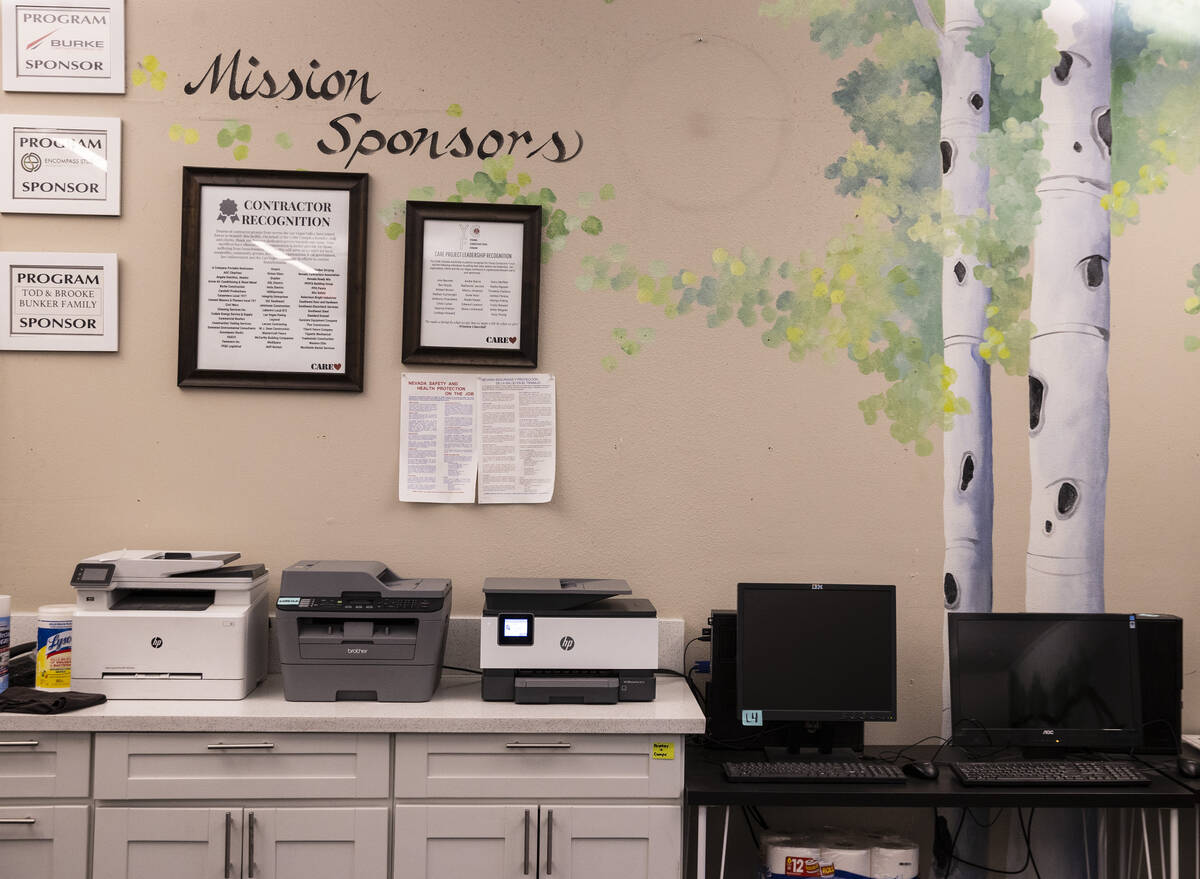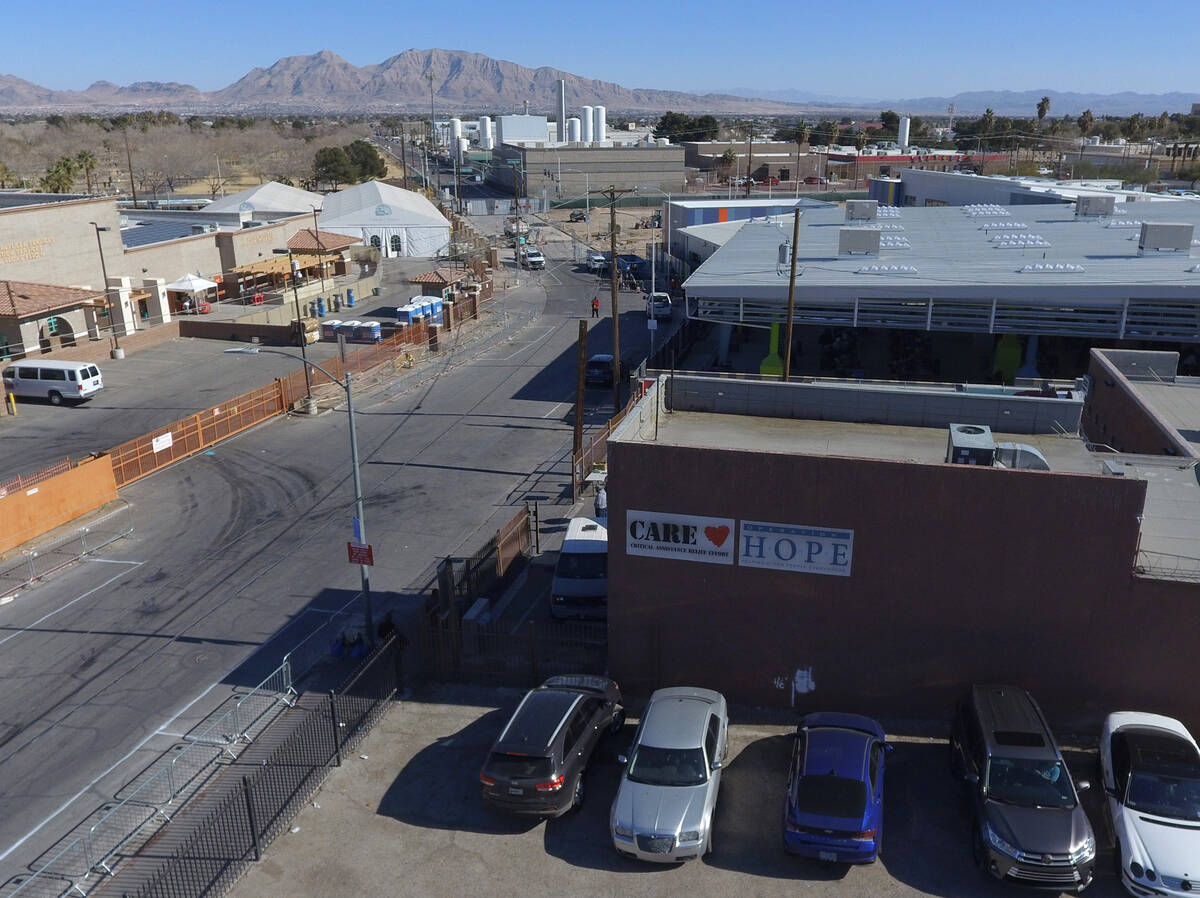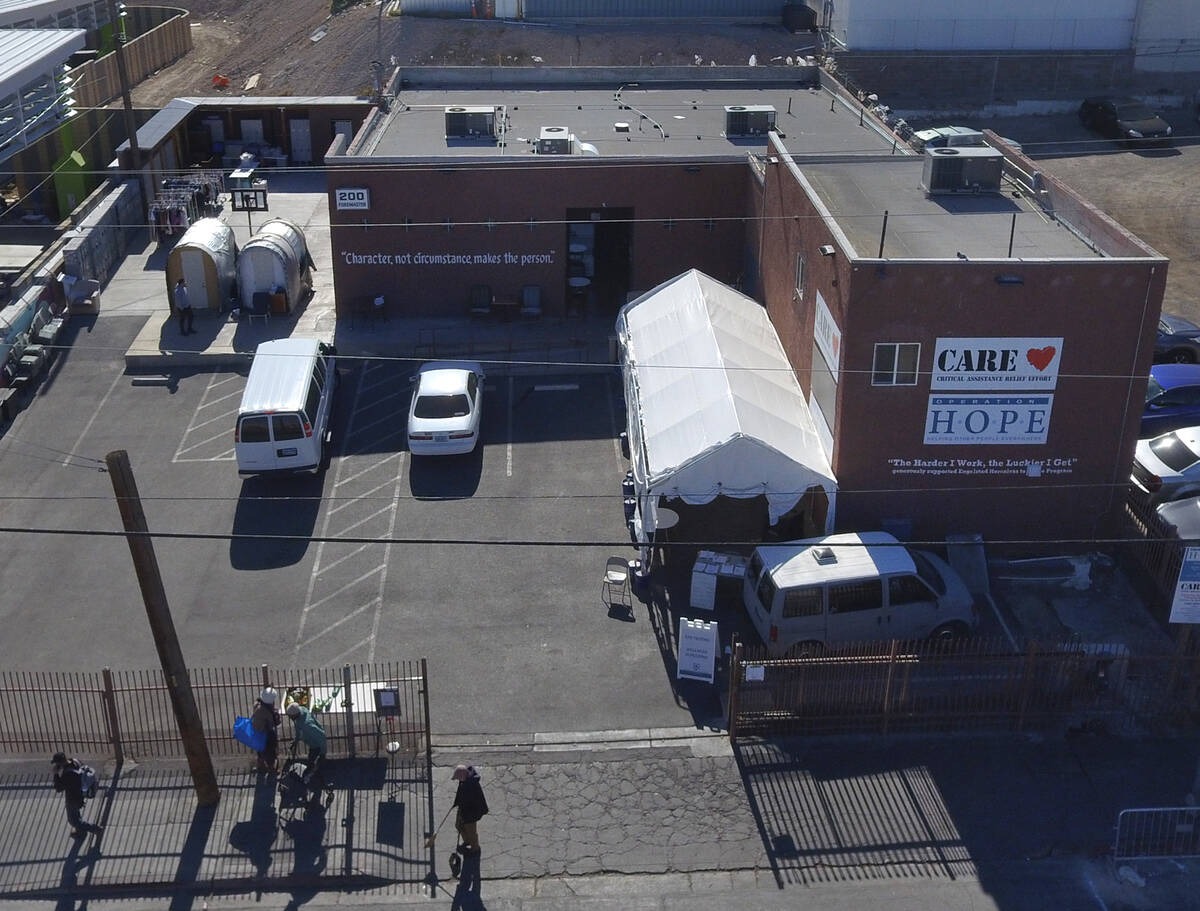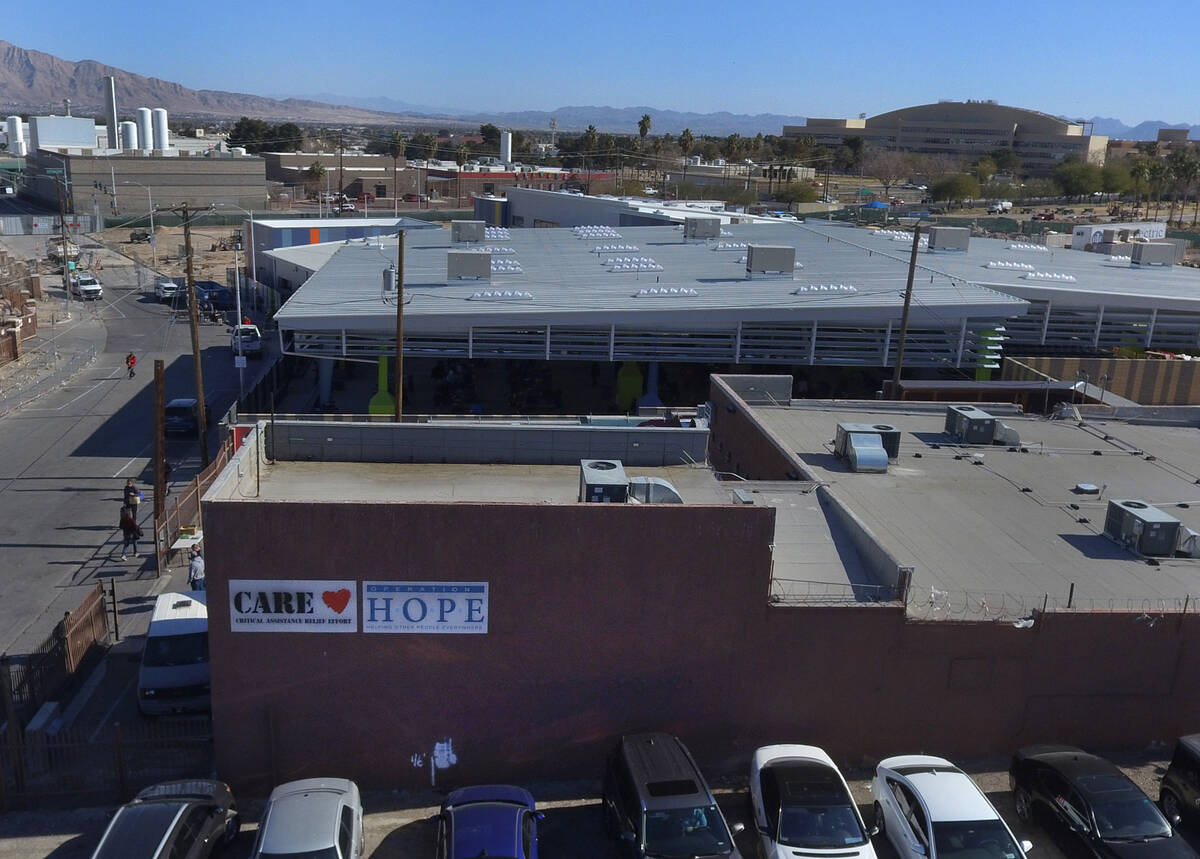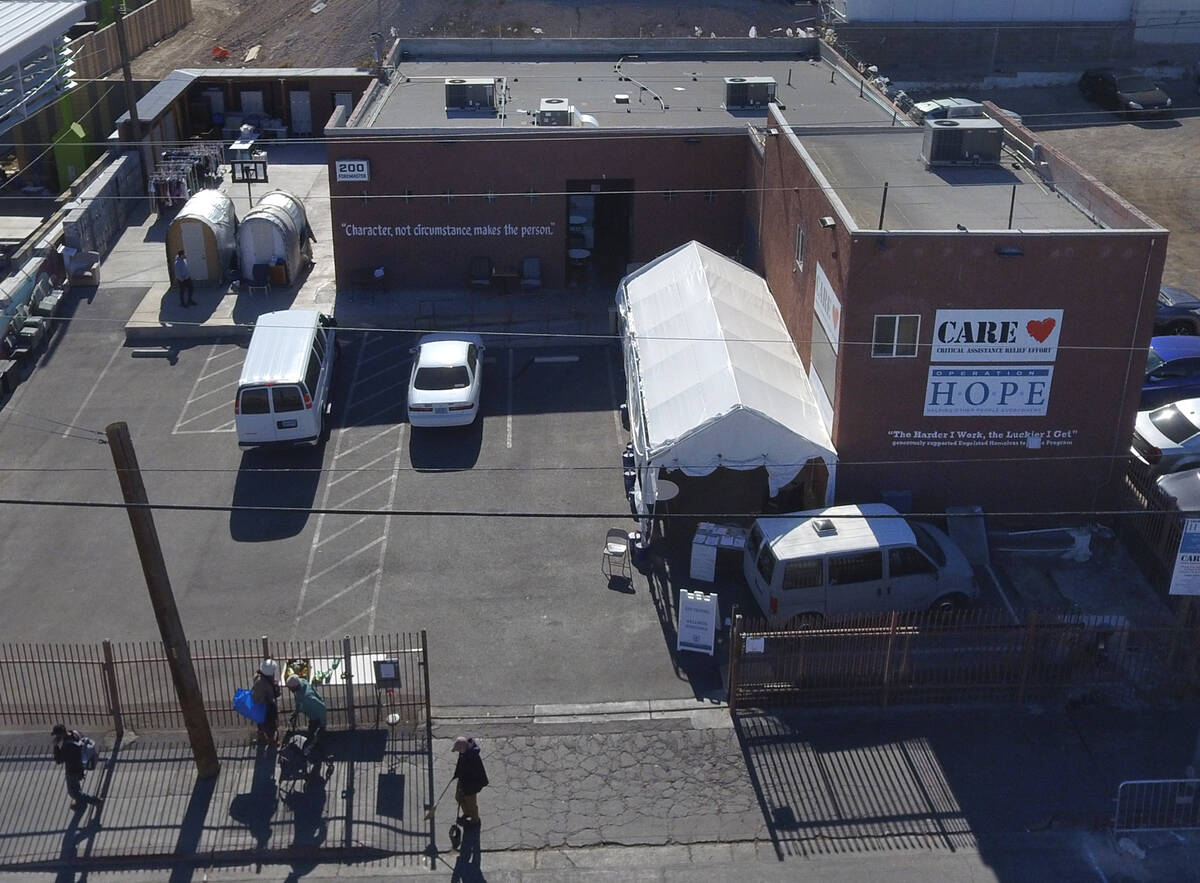Las Vegas wants this nonprofit’s land. Homeless aid is at stake.
Not even a decade ago, the abandoned former church on Foremaster Lane was overrun by squalor and stripped of copper, pipes and toilets.
Then a private nonprofit purchased the building from a bank in 2014 and, with assistance from dozens of charitable contractors, transformed the site into a homeless services operation. Last year alone, CARE Complex helped more than 3,000 people and provided even more with other necessities such as clothing, toiletries and computer access.
The complex is also a rotating home base for various organizations: Groups providing counseling, mobile showers, haircuts, dog grooming and other services have set up shop rent-free for varying periods of time. A medical clinic offers vital checks five days a week.
Kaleah Tawatao, director of services for CARE Complex, said that the nonprofit feels more like family than a workplace because they see the same clients so often.
But during a tour of the small facility this week in the so-called Corridor of Hope, a central hub for homeless services in downtown Las Vegas, there was a sense of uncertainty looming over the nonprofit’s future.
“To have to break the news like, ‘Oh, we might be condemned,’ it’s just heartbreaking,” Tawatao said.
Possible acquisition
The city of Las Vegas, which launched the adjacent and expanding Courtyard Homeless Resource Center three years after CARE Complex opened, is seeking to broaden its social services by constructing a nearby health and wellness center for the homeless. To do so, city officials say they need the nonprofit’s land.
The city’s most recent approach, to offer $1 million and consider taking the property through eminent domain if necessary, has ruffled feathers. On Jan. 19, plans were stalled for 60 days amid criticism from the nonprofit’s representatives and advocates, and some city lawmakers, setting off a two-month window for both sides to negotiate an amicable deal.
CARE Complex officials said this week that they would prefer to stay put, believing there’s enough room for them and the city’s planned two-story, nearly 9,000-square-foot clinic at the southeast corner of Main Street and Foremaster Lane.
If CARE Complex is forced to relocate, however, the city’s offer is more than $1.5 million short of the estimated need to reconstruct operations elsewhere, excluding the price of land, moving costs and other expenses, according to founder Mike Swecker, citing a third-party analysis. Swecker said he is concerned as well about getting the necessary zoning approvals, an often arduous and lengthy process.
It must also not be overlooked, he said, that the nonprofit purposefully set up in “ground zero,” where homeless clientele congregate, and that moving even a half-mile down the street would pose a sizeable challenge for a vulnerable population that isn’t very mobile.
“Obviously, that’s a lot of money,” Swecker said of the $1 million offer. “We can make a lot of difference in people’s lives. But where are we bringing our mission to?”
Not burdened by bureaucracy
Inside her office in the CARE Complex on Monday, Tawatao showed off two turtles in a tank: “Big Mac” and “Quarterpounder,” appropriately named by relative size.
They once belonged to a woman who was evicted from her apartment and could not keep them at the city’s courtyard. She still visits the reptiles. The nonprofit has also adopted a gray and white Siamese cat named “Ivory,” who is proficient in keeping rodents at bay and sleeps comfortably on a pet bed in the conference room.
Although perhaps immaterial in the grander scheme, Swecker said these quirks illustrate that the nonprofit is able to operate without red tape and absent the strings attached to government funding. It means social workers can do their jobs with autonomy and compassion, as opposed to going through the motions, according to Swecker and treasurer Jennifer Wikler, who both are volunteers.
With a yearly budget of no more than $170,000 , the nonprofit is forced to be creative. Tawatao, who is working on her master’s degree, is its only paid employee: She started assisting with checking clients in while she was a UNLV undergraduate student as part of a practicum required for graduation.
Three or four students working on their bachelor’s degrees in social work arrive each semester to provide help and gain experience.
Core services
The Homeless To Home program is one of CARE Complex’s core services. When a client can show at least $1,100 in monthly income, the nonprofit assists with $700 for move-in costs for an apartment and a $100 voucher after each of three checkups made during the first year, according to Tawatao.
“The numbers are staggering,” Wikler said, referencing a retention rate that she noted was about 90 percent.
The nonprofit caters to the working homeless or those who have recently worked, fostering self-reliance, although Swecker said it welcomes anyone.
It assists clients to get birth certificates, IDs and bus passes, and provides a telehealth booth, resumé writing and mail services and locker storage, which is presided over by a longtime volunteer, Marian Luke, affectionately known as the “locker queen” — a title she proudly displays on two custom T-shirts.
The locker program is so popular that there were only roughly 15 vacancies out of 252 lockers on Monday, although the nonprofit intentionally tries to keep at least some available for emergencies, Swecker said.
City: Not about parking lot
Before CARE Complex found its current location, the nonprofit started in 2004 by operating in the streets and from the nearby Salvation Army, according to Swecker. It expanded from a Sunday night feeding to offering services not otherwise available in the Corridor of Hope, he said.
When Las Vegas launched its homeless campus, Swecker said he viewed the move as an opportunity for collaboration. But after the city first threatened condemnation in 2018, he said the tenor of correspondence changed.
During the City Council meeting on Jan. 19, Swecker and others said they understood that the quarter-acre property would become a parking lot for the city’s new facility. Swecker reiterated his belief Monday that the city could find alternative places to accommodate vehicles.
While no city official sought to correct the record during that meeting, city Community Services Director Kathi Thomas said this week that parking was not the intended use.
“The land is to expand services, not parking,” she wrote in an email. “The health center and storage operations are two core services that need to expand.”
Open to ‘right situation’
City officials say that the health center will be integrated into the city’s low-barrier courtyard and enable the city to serve hundreds of more clients each day, furthering its vision of setting up a coordinated system of aid for the homeless.
Through a competitive bid process, the city selected Nevada Health Centers to operate the center, although the contract has not yet been finalized, according to Thomas, who oversees the city’s efforts to address homelessness.
“She’s doing what she thinks is the best thing,” Swecker said. “How she arrives at that, you know, obviously I really strongly disagree with.”
Whether the potential acquisition will pave the way for parking or the center itself, Swecker is optimistic about finding a solution in ongoing talks, which he said were the first negotiations between the two sides.
But he also did not necessarily think they would end with the nonprofit remaining at its present location.
“We would be open to moving, of course, in the right situation,” he said.
It’s a better scenario, he added, than the one they are confronting right now: “An eminent domain cloud hanging over a one-employee, grassroots organization fighting City Hall.”



